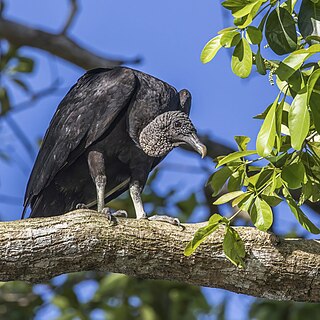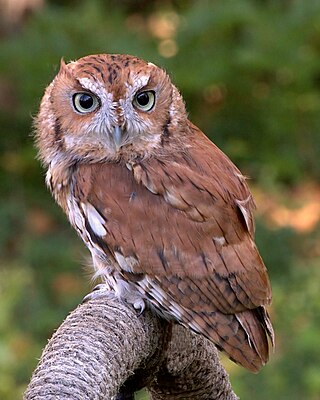
The black vulture, also known as the American black vulture, Mexican vulture, zopilote, urubu, or gallinazo, is a bird in the New World vulture family whose range extends from the southeastern United States to Perú, Central Chile and Uruguay in South America. Although a common and widespread species, it has a somewhat more restricted distribution than its compatriot, the turkey vulture, which breeds well into Canada and all the way south to Tierra del Fuego. It is the only extant member of the genus Coragyps, which is in the family Cathartidae. Despite the similar name and appearance, this species is not closely related to the Eurasian black vulture, an Old World vulture, of the family Accipitridae. For ease of locating animal corpses, black vultures tend to inhabit relatively open areas with scattered trees, such as chaparral, in addition to subtropical forested areas and parts of the Brazilian pantanal.
Psilops paeminosus is a species of gymnophthalmid lizard. It is endemic to the states of Sergipe and Bahia in the Northeast Region, Brazil.

Coragyps is a genus of New World vulture that contains the black vulture (Coragyps atratus) and two extinct relatives.

The Balsas screech owl is a species of owl in the family Strigidae. It is endemic to Mexico.

Macrogomphus is a genus of dragonfly in the family Gomphidae. It contains the following species:

The Balsas dry forests is a tropical dry broadleaf forest ecoregion located in western and central Mexico.

Screech owls are typical owls (Strigidae) belonging to the genus Megascops with 22 living species. For most of the 20th century, this genus was merged with the Old World scops owls in Otus, but nowadays it is again considered separately based on a range of behavioral, biogeographical, morphological, and DNA sequence data.
On 29 January 2010, the IUCN Red List of Threatened Species identified 2657 near threatened species, subspecies, stocks and sub-populations in the Animalia kingdom.

Creagrutus is a genus of characins found mostly in South America, with one species C. affinis extending into Panama in Central America.

Opius is a genus of wasps in the family Braconidae. This genus has a wide geographic range and contains the majority of species in the subfamily Opiinae.
Psilops is a genus of lizards in the family Gymnophthalmidae. They are endemic to Brazil.
Psilops mucugensis is a species of lizard in the family Gymnophthalmidae. It is endemic to Brazil.
The Sierra de Huautla is a mountain range and biosphere reserve in central Mexico. Located in southern Morelos, the Sierra de Huautla is a southern extension of the Trans-Mexican Volcanic Belt range into the Balsas Basin. The dry forests of Sierra are home to a diverse community of animals and plants, and the reserve's outstanding biodiversity is recognized by UNESCO.

Bryaxis is a genus of ant-loving beetles in the family Staphylinidae. There are more than 380 described species in Bryaxis.








